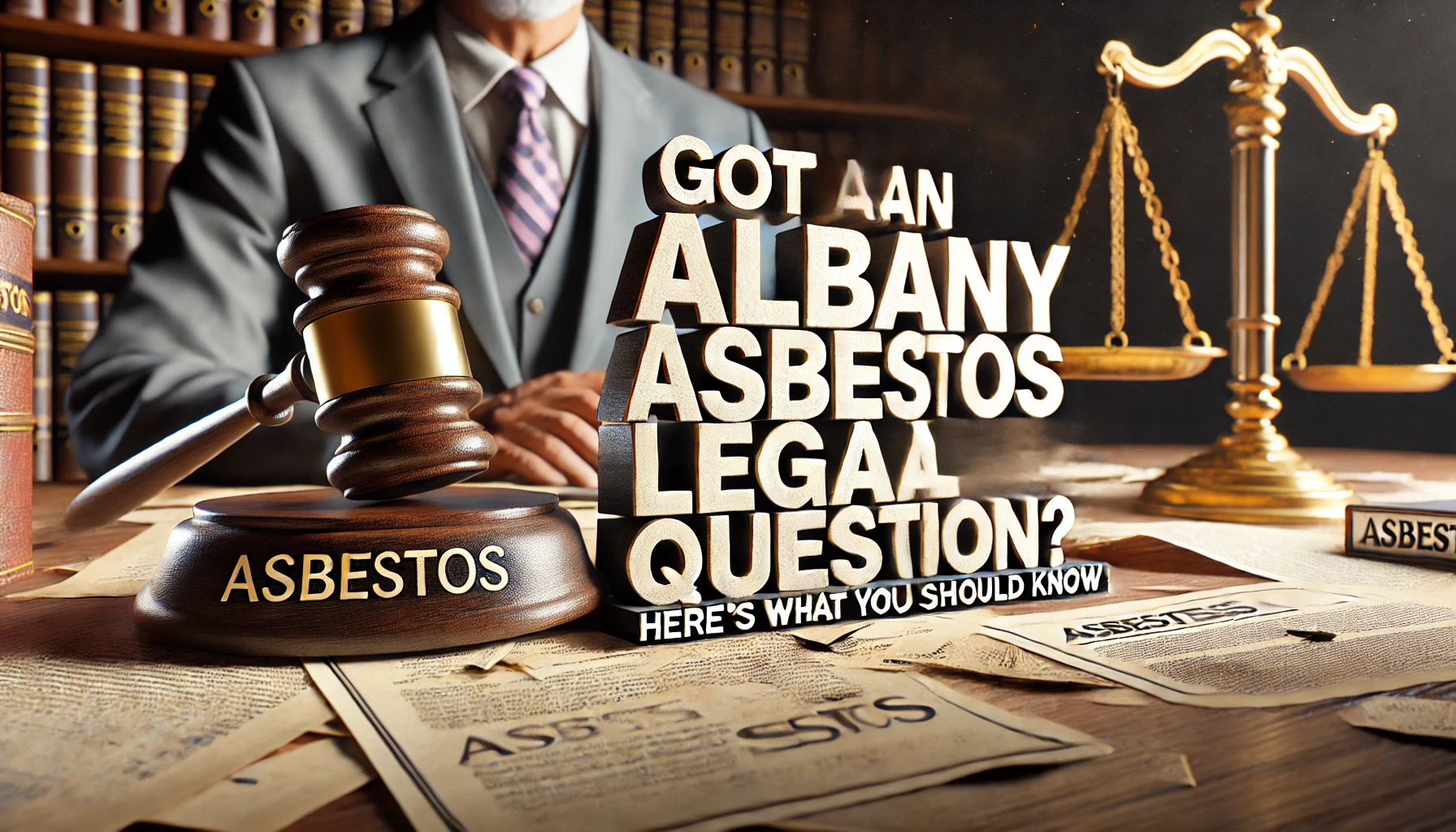Introduction
Imagine this: You or someone you care about has been exposed to asbestos in Albany. The stakes are high—your health, your future, and your peace of mind hang in the balance. Asbestos is not just a word; it’s a serious threat that has left many Albany residents with life-altering consequences. If you’re in this situation, you’re not alone, and you’re likely filled with questions.
Understanding the Issue
Asbestos exposure isn’t just a health concern; it’s a legal minefield. In Albany, many buildings, schools, and workplaces have been found to contain asbestos, leading to potentially deadly consequences. Mesothelioma, lung cancer, and other serious diseases are common among those exposed to this hazardous material.
Understanding Asbestos and Its Risks
What is Asbestos?
Asbestos is a naturally occurring mineral made up of tiny fibers. For decades, it was widely used in construction, manufacturing, and other industries due to its durability and heat resistance. You might find asbestos in older homes, schools, and even some workplaces in Albany. Why is it dangerous? When asbestos fibers become airborne, they can be inhaled or ingested. These fibers are incredibly tough and can lodge themselves in your lungs or other organs, causing severe health problems over time.
Health Implications of Asbestos Exposure
Exposure to asbestos is a serious health hazard. The diseases it causes often take years, even decades, to develop, making early detection challenging. Here are the key conditions linked to asbestos exposure:
- Mesothelioma: A rare but aggressive cancer that primarily affects the lining of the lungs, abdomen, or heart. It’s almost exclusively caused by asbestos exposure. Symptoms include chest pain, difficulty breathing, and fluid buildup around the lungs.
- Lung Cancer: Asbestos exposure increases the risk of developing lung cancer. Symptoms may include a persistent cough, weight loss, and chest pain.
- Asbestosis: A chronic lung disease caused by inhaling asbestos fibers, leading to scarring of lung tissue. Symptoms include shortness of breath, a dry cough, and chest tightness.
Early detection is crucial, but the symptoms of asbestos-related diseases often mimic other common ailments, making it difficult to diagnose without thorough medical examination. If you suspect exposure, don’t wait—seek medical advice immediately.
Legal Rights and Options for Asbestos Victims in Albany
Laws and Regulations Governing Asbestos in Albany
Albany has strict laws and regulations in place to manage the use, handling, and disposal of asbestos. These regulations are designed to protect the public from the dangerous effects of asbestos exposure. In New York State, the Department of Environmental Conservation (DEC) and the Department of Labor enforce these rules, ensuring that asbestos is safely handled in any demolition, renovation, or construction project.
Compliance with these laws is not just a legal requirement—it’s a matter of public health. Violations can lead to severe penalties and legal action, and failing to follow the proper procedures can expose people to life-threatening risks.
Statute of Limitations
When it comes to filing asbestos-related claims in Albany, time is of the essence. The statute of limitations in New York generally allows victims to file a lawsuit within three years from the date they were diagnosed with an asbestos-related illness. For wrongful death claims, the timeframe is two years from the date of death.
It’s crucial to act quickly. If you miss these deadlines, you could lose your right to seek compensation. This makes timely legal action essential to preserving your rights and holding those responsible accountable.
Potential Legal Claims
As an asbestos victim in Albany, you have several legal options to pursue compensation:
- Personal Injury Lawsuits: If you’ve been diagnosed with an asbestos-related illness, you can file a personal injury lawsuit against the parties responsible for your exposure. This might include employers, manufacturers, or property owners.
- Wrongful Death Claims: If a loved one has died due to asbestos exposure, you can file a wrongful death claim to seek compensation for your loss, including medical expenses, funeral costs, and loss of income.
- Workers’ Compensation: If your asbestos exposure occurred at work, you might be eligible for workers’ compensation benefits. This can cover medical expenses and lost wages, but it may limit your ability to file a lawsuit against your employer.
Each type of claim has its own nuances and legal requirements, so it’s vital to consult with an experienced asbestos attorney to determine the best course of action for your situation. Don’t delay—the sooner you explore your legal options, the better your chances of achieving a successful outcome.
Understanding Jackson Asbestos Legal Questions: What You Need to Know
Navigating the Legal Process
Steps to Take After a Diagnosis
Receiving an asbestos-related diagnosis can be overwhelming, but taking the right steps early on can make a significant difference in your legal journey. Here’s a step-by-step guide to help you navigate this challenging time:
- Gather Evidence: Start by collecting any medical records that document your diagnosis. This includes doctor’s notes, test results, and any treatments you’ve undergone. The more detailed your records, the stronger your case will be.
- Document Exposure: It’s crucial to identify and document where and how you were exposed to asbestos. This might involve looking into your work history, residence, or any products you’ve used that could have contained asbestos. Be as specific as possible—dates, locations, and details matter.
- Consult with a Specialized Attorney: Asbestos cases are complex, so it’s important to consult with a lawyer who has experience in handling asbestos-related claims. They can guide you on the best course of action and ensure that you’re taking all necessary steps to build a strong case.
- File a Claim: Once your attorney has reviewed your case, they’ll help you file a claim against the responsible parties. This could involve a personal injury lawsuit, a wrongful death claim, or a workers’ compensation claim, depending on your situation.
- Prepare for the Legal Process: Your attorney will walk you through what to expect as your case progresses, including discovery, settlement negotiations, and possibly a trial. Stay informed and engaged throughout the process to ensure your rights are protected.
Working with an Experienced Asbestos Attorney
Choosing the right attorney can make all the difference in your case. Here’s why working with an experienced asbestos attorney is so crucial:
- Expertise in Asbestos Litigation: Asbestos cases are not like other personal injury cases. They require a deep understanding of the science behind asbestos exposure, the laws that govern asbestos use, and the strategies that can maximize compensation. An experienced attorney will have this knowledge and use it to your advantage.
- Navigating Legal Complexities: The legal process can be complicated, with many deadlines, filings, and procedural requirements. An experienced attorney knows how to navigate these complexities, ensuring that your case is handled efficiently and effectively.
- Maximizing Compensation: An experienced asbestos lawyer will know how to build a strong case that highlights the full impact of your illness, including medical costs, lost wages, and pain and suffering. They’ll fight to get you the maximum compensation you deserve.
- Providing Peace of Mind: Dealing with a serious illness is hard enough without the added stress of legal proceedings. An experienced attorney can take much of that burden off your shoulders, handling the legal work so you can focus on your health and well-being.
In short, having the right attorney by your side can significantly increase your chances of a successful outcome. Don’t settle for anything less than the best—your health and future are too important.
Compensation and Settlements
Types of Compensation Available
As an asbestos victim, you may be entitled to several types of compensation to help cover the damages caused by your exposure. Here’s a breakdown of what you could potentially receive:
- Medical Expenses: This covers the cost of your medical treatments, including doctor visits, surgeries, medications, and ongoing care. Asbestos-related illnesses often require extensive and costly medical attention, and this compensation ensures that you’re not left to bear these expenses alone.
- Lost Wages: If your illness has prevented you from working, you can seek compensation for the income you’ve lost as a result. This can include both past and future lost wages, especially if your condition has permanently impacted your ability to work.
- Pain and Suffering: Beyond the financial costs, asbestos exposure can cause significant physical pain and emotional distress. Compensation for pain and suffering acknowledges the severe impact that the illness has had on your quality of life.
- Punitive Damages: In some cases, the court may award punitive damages to punish the responsible parties for their negligence and deter others from similar behavior. This is especially common when the responsible party knew about the asbestos risk but failed to take appropriate action.
Settlement vs. Trial
When pursuing compensation, you may face the decision of whether to settle out of court or take your case to trial. Here’s what you need to know about each option:
- Settlement: Most asbestos cases are resolved through settlements before they ever reach trial. A settlement can provide a quicker resolution, allowing you to receive compensation without the stress and time involved in a court case. However, the settlement amount may be lower than what you could potentially win at trial.
- Advantages: Settling out of court can be less time-consuming, less expensive, and less stressful. It also offers a certain level of predictability, as you agree on a specific amount with the defendant rather than leaving it up to a jury.
- Trial: If a fair settlement can’t be reached, your case may go to trial. While this can lead to a larger award, it’s also riskier—there’s no guarantee you’ll win, and trials can be lengthy and expensive. Trials also involve a lot of uncertainty, as the final decision lies in the hands of the jury or judge.
- Factors to Consider: The decision to settle or go to trial depends on several factors, including the strength of your case, the willingness of the defendant to negotiate, and your own preference for a quicker resolution versus the potential for a higher payout.
Your attorney will help you weigh these factors and decide the best course of action based on your unique situation. Remember—every case is different, and what’s right for one person might not be right for another. It’s about finding the path that best meets your needs and helps you achieve the justice you deserve.
Addressing Lancaster Asbestos Legal Questions: Essential Information
Workers’ Rights and Employer Responsibilities
Workers’ Rights in Asbestos Cases
If you’re a worker in Albany and you suspect that you’ve been exposed to asbestos in the workplace, it’s crucial to understand your rights. Here’s what you need to know:
- Right to Information: You have the right to be fully informed about any asbestos risks in your workplace. Your employer is legally required to notify you if asbestos is present and to provide clear information on how to protect yourself.
- Right to Training: Employers must provide you with safety training on how to handle asbestos safely. This training should cover proper procedures, protective equipment, and what to do in case of exposure. If you haven’t received this training, you have the right to request it.
- Right to a Safe Working Environment: Above all, you have the right to a safe working environment. This means your employer must take all necessary steps to minimize or eliminate asbestos exposure, including following all relevant safety regulations and guidelines. If your workplace is unsafe, you have the right to report the conditions without fear of retaliation.
- Right to Compensation: If you’ve been exposed to asbestos and develop a related illness, you have the right to seek compensation through workers’ compensation claims or other legal avenues. This compensation can cover medical expenses, lost wages, and more.
Employer Responsibilities
Employers in Albany have significant legal responsibilities when it comes to protecting workers from asbestos exposure. Here’s what’s required by law:
- Provide Safety Training: Employers must offer comprehensive safety training to any employees who may come into contact with asbestos. This training should be regular and updated as needed to reflect any changes in the workplace or in safety regulations.
- Conduct Regular Inspections: Employers are required to conduct regular inspections of the workplace to identify any potential asbestos hazards. If asbestos is found, it must be contained or removed following strict safety protocols.
- Maintain Proper Documentation: Employers must keep detailed records of any asbestos-related incidents, inspections, and training sessions. These records are crucial for ensuring compliance and for protecting both the employer and employees.
- Follow Legal Guidelines: Employers must adhere to all federal, state, and local regulations regarding asbestos. This includes proper labeling, disposal, and containment of asbestos materials, as well as ensuring that all safety measures are in place and being followed.
- Ensure Worker Safety: Above all, employers are responsible for providing a safe working environment. This means taking proactive steps to protect workers from asbestos exposure, providing the necessary equipment, and ensuring that all safety protocols are strictly followed.
Failure to meet these responsibilities can result in legal action and severe penalties. Employers who neglect these duties not only put their workers at risk but also face significant legal and financial consequences. If you believe your employer is not meeting these responsibilities, it’s important to seek legal advice to protect your rights.
Conclusion
Recap
Understanding your legal rights and the risks associated with asbestos exposure is crucial, especially if you live or work in Albany. We’ve covered the serious health implications of asbestos, the legal avenues available for seeking compensation, the importance of acting within the statute of limitations, and the responsibilities that employers have to protect their workers. By staying informed and taking timely action, you can protect yourself and ensure that those responsible for your exposure are held accountable.
Call to Action
If you suspect you’ve been exposed to asbestos or are experiencing related symptoms, don’t wait. Consult with a legal professional and seek medical advice immediately. Early action can make all the difference in securing the compensation and care you deserve.
FAQs
What is the statute of limitations on asbestos in NY?
In New York, the statute of limitations for asbestos-related personal injury claims is three years from the date of diagnosis. For wrongful death claims, it’s two years from the date of death.
What is the OSHA law for asbestos?
OSHA regulates asbestos exposure in the workplace through strict guidelines that include permissible exposure limits, required protective equipment, and training for workers handling asbestos materials.
What are the asbestos safety standards in the UK?
In the UK, asbestos safety standards are governed by the Control of Asbestos Regulations 2012. These regulations require employers to manage asbestos risks, provide appropriate training, and ensure that asbestos-containing materials are safely handled and removed.
How do I claim for asbestos exposure?
To claim for asbestos exposure, you need to file a personal injury lawsuit or a workers’ compensation claim. It’s essential to work with an experienced asbestos attorney who can guide you through the process and help you gather the necessary evidence.
What year was asbestos banned?
In the United States, the use of asbestos in many products was banned in 1989 under the EPA’s Asbestos Ban and Phase-Out Rule. However, some uses of asbestos are still allowed under specific regulations.
How common is asbestos in houses?
Asbestos is common in homes built before the 1980s. It was widely used in insulation, roofing, flooring, and other building materials. If you live in an older home, it’s important to have it inspected for asbestos, especially before any renovation work.
What is the average asbestos claim?
The average asbestos claim can vary widely depending on the specifics of the case, but settlements often range from $1 million to $1.4 million. However, the exact amount depends on factors like the severity of the illness, the extent of exposure, and the jurisdiction where the claim is filed.
Explore the Legal Service realm with The Expert Law. Visit our website for limitless inspiration!





